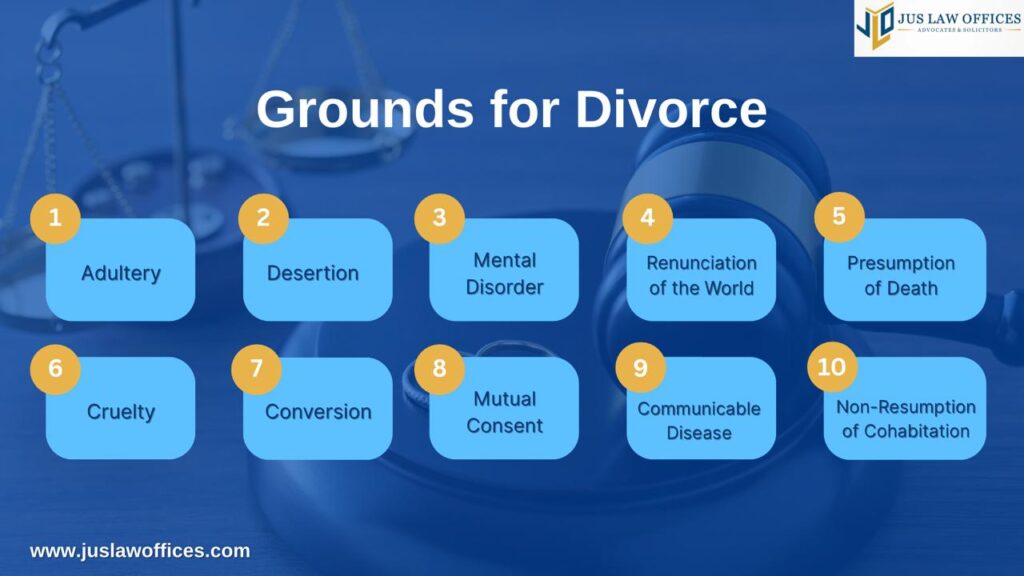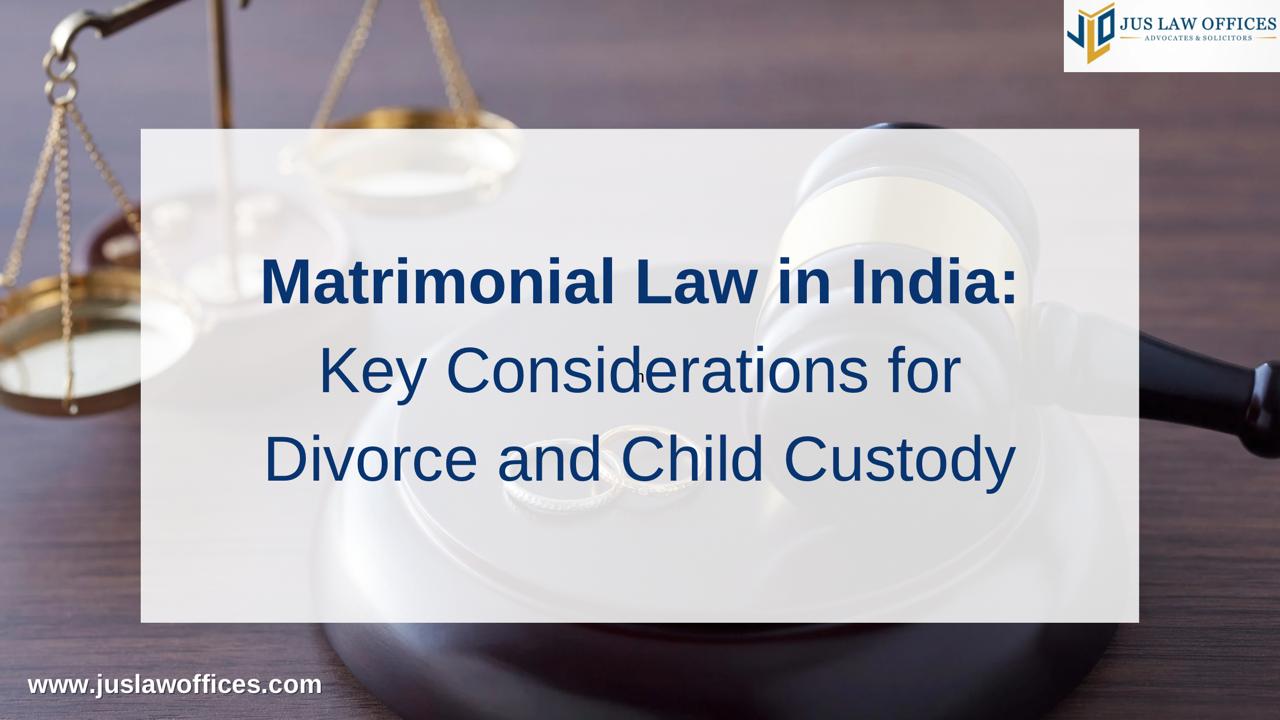Complexities of divorce and child custody in India can be overwhelming. This comprehensive guide aims to provide clarity on the legal procedures, rights, and considerations involved, helping individuals make informed decisions during such challenging times.
Legal Framework Governing Divorce in India
India’s matrimonial laws are diverse, reflecting its pluralistic society. The applicable law often depends on the religious affiliation of the parties:
- Hindu Marriage Act, 1955: Applies to Hindus, Buddhists, Jains, and Sikhs.
- Muslim Personal Law (Shariat) Application Act, 1937: Governs Muslims.
- Parsi Marriage and Divorce Act, 1936: Pertains to Parsis.
- Indian Divorce Act, 1869: Applies to Christians.
- Special Marriage Act, 1954: A secular law applicable to interfaith marriages and those opting for a civil marriage.
Each of these laws outlines specific grounds and procedures for divorce, including provisions for alimony, maintenance, and child custody.
Grounds for Divorce

Common grounds for divorce across various personal laws include:
- Adultery: Engaging in a sexual relationship outside the marriage.
- Cruelty: Physical or mental harm inflicted by one spouse on the other.
- Desertion: Abandonment of one spouse by the other without reasonable cause.
- Conversion: Changing religion without the consent of the other spouse.
- Mental Disorder: Unsoundness of mind making it unreasonable to expect the petitioner to live with the respondent.
- Communicable Disease: Suffering from a communicable venereal disease.
- Renunciation of the World: Entering a religious order and renouncing worldly life.
- Presumption of Death: Spouse not heard of as being alive for seven years.
Under the Special Marriage Act, 1954, additional grounds include:
- Mutual Consent: Both parties agree to dissolve the marriage amicably.
- Non-Resumption of Cohabitation: After a decree of judicial separation, the parties have not resumed cohabitation for one year.
Divorce Procedure
The divorce process typically involves the following steps:
- Filing a Petition: The aggrieved party files a divorce petition in the appropriate family court.
- Service of Summons: The court serves a notice to the other party.
- Response: The respondent files a written statement in reply.
- Trial: Both parties present evidence and witnesses.
- Decree: The court issues a decree of divorce if satisfied with the grounds presented.
In cases of mutual consent, the process is more straightforward, requiring both parties to file a joint petition and appear before the court after a statutory waiting period, usually six months.
Also Read: All About Family Law in India: Understanding Your Rights
Child Custody Considerations
Child custody is a paramount concern during divorce proceedings. The primary legislation governing child custody in India includes:
- Guardians and Wards Act, 1890: A secular law applicable to all citizens, focusing on the welfare of the child.
- Hindu Minority and Guardianship Act, 1956: Applies to Hindus, emphasizing the welfare of the minor.
The court considers several factors while deciding custody:
- Child’s Welfare: The paramount consideration, encompassing emotional, educational, and physical well-being.
- Parental Capability: Ability of each parent to provide for the child’s needs.
- Child’s Preference: If the child is of an age and maturity to express a preference.
- Parental Conduct: Behavior and lifestyle of each parent.
Types of custody arrangements include:
- Physical Custody: Child resides with one parent, with visitation rights to the other.
- Joint Custody: Child alternates between both parents’ residences.
- Legal Custody: Right to make decisions about the child’s upbringing, education, and health.
Maintenance and Alimony
Maintenance refers to the financial support provided to a spouse or child post-divorce. Key provisions include:
- Section 144, BNSS, 2023: Mandates maintenance to wives, children, and parents unable to maintain themselves.
- Personal Laws: Each personal law has specific provisions regarding maintenance and alimony.
Factors influencing maintenance include:
- Income and Assets: Financial standing of both parties.
- Standard of Living: Lifestyle enjoyed during the marriage.
- Age and Health: Physical condition and age of the spouse seeking maintenance.
- Custody of Children: Parents with custody may receive additional support.
Role of Family Courts
Family courts, established under the Family Courts Act, 1984, specialize in matters related to family disputes, including divorce and child custody. These courts aim to provide a less formal and more conciliatory environment, encouraging amicable settlements.
Mediation and Alternate Dispute Resolution (ADR)
Divorce and custody battles often take a significant emotional toll on families. Recognizing this, the Indian legal system actively encourages mediation and conciliation to resolve disputes amicably:
- Section 9 of the Family Courts Act, 1984 mandates family courts to attempt settlement before proceeding with a trial.
- Section 89 of the Civil Procedure Code, 1908 supports ADR mechanisms like mediation and arbitration.
Mediation offers a platform for parents to collaboratively decide on parenting plans, custody schedules, and financial arrangements, often leading to more sustainable outcomes and reduced litigation costs.
Also Read: Debt Recovery: Legal Strategies for Effective Business Collection
Constitutional Backing and Fundamental Rights
While matrimonial laws in India are primarily codified under personal and secular statutes, several constitutional provisions act as guiding principles in ensuring justice, equality, and protection of individual rights:
- Article 14 – Right to Equality before the Law: Ensures that both spouses are treated equally in the eyes of the law, irrespective of gender or religion.
- Article 15(3) – Protective Discrimination: Empowers the State to make special provisions for women and children, often invoked to safeguard their interests during matrimonial disputes.
- Article 21 – Right to Life and Personal Liberty: Interpreted to include the right to live with dignity, which has direct relevance in cases of cruelty, domestic abuse, and the right to a fair custody decision.
- Article 39(e) & (f) (Directive Principles of State Policy): Oblige the State to ensure that children are not abused and that childhood and youth are protected against exploitation and moral abandonment.
These constitutional rights reinforce the judicial interpretation of matrimonial law, particularly in custody cases, where the child’s best interests are paramount and protected by the fundamental right to life and dignity.
Recent Legal Developments
- Uniform Civil Code (UCC) Discussions: While not yet enacted nationwide, ongoing debates around UCC in several states aim to unify personal laws under a common framework—potentially impacting divorce, maintenance, and custody laws in the future.
- Child Custody Reforms: The Law Commission of India has proposed guidelines for shared parenting models, emphasizing co-parenting responsibilities and equal involvement post-divorce, especially in urban family courts.
- Digital Evidence & E-Filing: Family courts are increasingly accepting digital evidence (texts, emails, call records) in matrimonial disputes. Additionally, e-filing systems have been adopted in metropolitan cities for greater convenience and transparency.
- Women’s Rights Strengthened: The Supreme Court has upheld several judgments reinforcing women’s rights in matrimonial homes and recognizing their equal contribution in joint matrimonial property, impacting alimony and settlement negotiations
Your Rights During Divorce and Custody Proceedings
Whether you’re a spouse or a parent, it’s vital to know your legal rights:
As a Spouse:
- You have the right to initiate divorce on valid legal grounds under your applicable personal law.
- You can claim maintenance if financially dependent and unable to sustain yourself post-separation.
- You have the right to a fair division of property, including stridhan (in case of women).
As a Parent:
- You can apply for custody, visitation rights, or joint parenting based on your child’s welfare.
- You may seek sole custody if the other parent is unfit due to abuse, addiction, or negligence.
- You are entitled to be part of decisions about your child’s health, education, and overall development, even if you don’t have physical custody.
Things to Keep in Mind
- Always document communication and agreements regarding custody and support.
- Courts consider child maintenance a priority, and defaulting on payments can lead to legal action.
- If you’re facing domestic violence, seek protection under the Protection of Women from Domestic Violence Act, 2005.
- Engage a family law advocate with experience in handling sensitive matters involving children and high-conflict divorce.
Key Takeaways
- Legal Diversity: India’s matrimonial laws vary based on religion, but all prioritize the welfare of children and equitable treatment of spouses.
- Child’s Welfare: In custody matters, the child’s best interests are paramount, with courts considering various factors to ensure their well-being.
- Maintenance Rights: Both spouses and children have rights to financial support post-divorce, determined by multiple factors.
- Family Courts: Specialized courts aim to resolve family disputes efficiently and amicably.
Understanding these legal frameworks can empower individuals to navigate divorce and custody proceedings
Conclusion
Divorce and child custody are deeply personal matters, yet they unfold within a strict legal structure governed by diverse statutes, constitutional mandates, and judicial precedents. By understanding your rights and the applicable procedures, you can better navigate this difficult phase with clarity and confidence.
Whether you’re contemplating separation, in the middle of a legal battle, or simply want to know more about your options, staying informed is your first step toward a secure and fair resolution. Always consult a qualified family law practitioner to ensure your and your child’s rights are fully protected.

